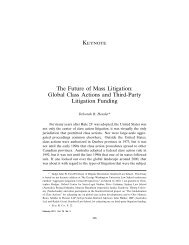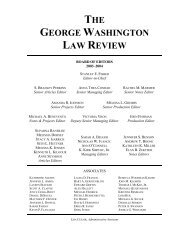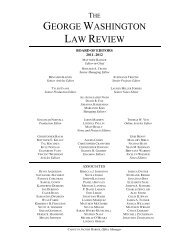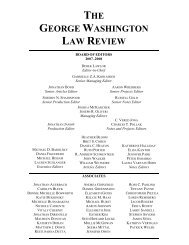View PDF - The George Washington Law Review
View PDF - The George Washington Law Review
View PDF - The George Washington Law Review
Create successful ePaper yourself
Turn your PDF publications into a flip-book with our unique Google optimized e-Paper software.
2010] Oral History and the Study of the Judiciary 857<br />
ducted, 54 and the depth of his preparation and the level of skill he<br />
brought to the task is evident from a review of the transcript. Similarly,<br />
letters to Judge Fairchild from the person who conducted the<br />
1985 history provide some sense of his level of preparation, though<br />
getting copies of those required going through Judge Fairchild’s papers<br />
held by the Wisconsin Historical Society. 55 Materials available<br />
elsewhere similarly indicate that the 1998 history is part of a project in<br />
which the interviewers were advised by professional oral historians. 56<br />
<strong>The</strong> resulting problem is not that the interviewers were in some general<br />
sense unprepared, but that the documents and tapes that ultimately<br />
became available to researchers provide no information that<br />
speaks to the point.<br />
<strong>The</strong>re are other pieces of information relating to the manner in<br />
which the history was taken that would be helpful to an assessment of<br />
the validity of an interview that are likewise not provided. It would be<br />
helpful to know, for example, whether and to what extent there was a<br />
pre-interview discussion of the subjects that would be covered. Here<br />
again, there are clues. <strong>The</strong> correspondence leading up to the 1985<br />
interview includes “an outline of the areas of discussion” that the interviewer<br />
anticipated covering. 57 One of the questions in the 1998 interview<br />
references a discussion between Judge Fairchild and the<br />
interviewer that took place the preceding week. 58 Beyond that, however,<br />
there is no indication of the extent to which Judge Fairchild was<br />
primed for each discussion. Another missing piece of contextual information<br />
concerns whether Judge Fairchild had an opportunity to review<br />
the transcripts of the 1992 and 1998 interviews. Without a sense<br />
of whether Judge Fairchild knew what the questions would be or had<br />
an opportunity to edit his answers, it is difficult to fully assess those<br />
answers. Of course, neither prior knowledge of the questions nor an<br />
ability to review an interview transcript necessarily make the product<br />
54 DOMNARSKI, supra note 20, at 2–3.<br />
55 Copies of these papers are on file with the author, obtained on October 15, 2009, from<br />
the Wisconsin Historical Society, located in Madison, Wisconsin. For more information on the<br />
Wisconsin Historical Society, visit http://www.wisconsinhistory.org/.<br />
56 See WIS. COURT SYS., supra note 50, at 4 (“Wisconsin State Historical Society oral historians<br />
advised Court staff on the project and court reporters volunteered to transcribe the<br />
interviews.”).<br />
57 Letter from James A. Cavanaugh to Judge Thomas E. Fairchild, U.S. Court of Appeals<br />
for the Seventh Circuit (Mar. 1, 1985) (on file with the Wisconsin Historical Society). <strong>The</strong> two<br />
topics relating to Judge Fairchild’s judicial career were labeled as “Supreme Court Election” and<br />
“Appointment to U.S. Court of Appeals.” Id.<br />
58 1998 Interview, supra note 50, at 20 (“I know you and I talked about this last week, but<br />
I just want to get it down on the record . . . .”).



